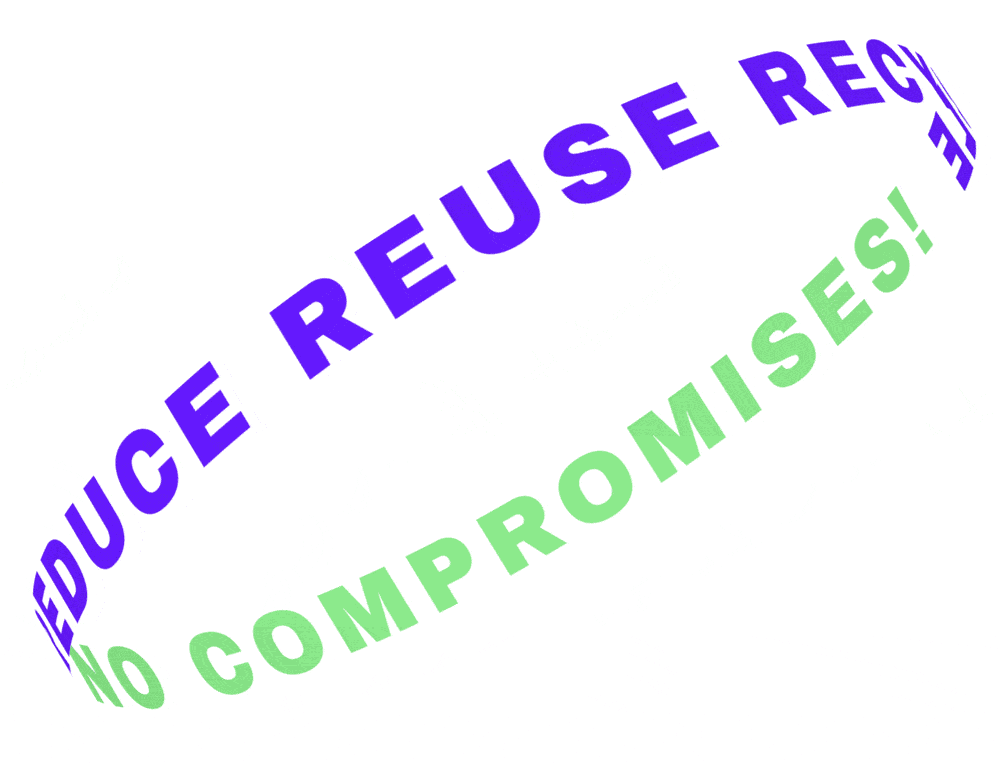
SUSTAINABILITY
Recycling That Actually Works: Closing the Loop on Packaging Waste
At Disruptive Packaging, we’re not just talking about sustainability—we’re engineering it into every stage of the packaging lifecycle.

The Myth of “Curb-side Recyclable”
Let’s clear up a misconception:
We don’t claim our product is curb-side recyclable. While some materials like polypropylene (PP) are technically recyclable, it’s rarely accepted by municipal programs and most often ends up in landfill. PP boxes, made from 80–100% plastic, contribute heavily to plastic waste.
The future is changing:
Many countries and U.S. states are now introducing plastic taxes based on the percentage of plastic in packaging. Our packaging contains up to 70% less plastic than conventional PP alternatives, offering a real environmental and commercial advantage.
Real Recycling. Closed Loop. Global Capability.
Unlike most packaging suppliers, we’ve built a fully integrated recycling infrastructure. Our closed-loop recycling system is already operational and proven in Australasia and Asia Pacific—and we’re scaling globally:
-
Kuala Lumpur, Malaysia
-
Ningbo, China
-
Melbourne and Brisbane, Australia
-
Mexicali, Mexico (2025 launch)
Across these facilities, all returned products as well as production waste materials are collected, recycled, and remanufactured into new packaging—on the same production lines. This in-line recycling capability reduces environmental impact and improves efficiency. It’s sustainability that works, not just in theory—but in practice.
Multi-Life, Multi-Purpose
Our packaging is not just recyclable—it’s also reusable, and we have case studies proving multiple reuses per unit. Our proprietary blend of HDPE and calcium carbonate can also be recycled and repurposed by third-party processors into products, such as:
-
Pipes
-
Outdoor furniture
-
Shopping bags
-
Shampoo bottles
-
Food containers
-
Toys and more
It’s a material with true downstream value.
The Hidden Truth About Alternatives
Let’s break down the environmental reality of other materials:
-
Waxed Cardboard: Not recyclable. The wax coating prevents fibre recovery.
-
Coated Cardboard: Often rejected by recyclers due to plastic films or coatings.
-
Contaminated Cardboard: Food-soiled cardboard is typically landfilled.
-
Expanded Polystyrene (EPS): Difficult to recycle. Bulky and expensive to transport. EPS is banned in many jurisdictions for food applications.
What About Cardboard?
Cardboard’s reputation as the “green option” is outdated. Worldwide only ~60% of corrugated cardboard is recycled (United Nation Environment Programme (UNEP) 2018).
Even when recycled, it requires:
-
30%+ virgin fibre input due to fibre degradation
-
High volumes of water and energy
-
A process that generates sludge, CO₂, and chemical by-products
In contrast, our recycling process uses minimal water and energy, with a significantly lower total lifecycle footprint.
Coming Soon - Compostable
In markets where we can’t retrieve material for recycling, we’re launching a certified industrial compostable range in 2025—meeting standards like ASTM D6400/D6868 and BPI certification. This ensures sustainability across every supply chain—no matter the location.


CIRCULAR WHERE POSSIBLE.
COMPOSTABLE WHERE NEEDED.
ALWAYS SMARTER.
URTHCOR ENVIRONMENTAL FEATURES
Environmentally sustainable packaging, designed to replace high-emission materials, such as, EPS and waxed cardboard while delivering superior performance and sustainability outcomes.
Benefits and features of URTHCOR include:
100% Closed Loop Recyclable
Designed to save millions of tonnes of harmful products such as waxed cardboard and polystyrene, from entering landfill each year

Made of Natural Materials
Up to 70% Calcium Carbonate composition, reducing the prevalence of polystyrene and cardboard waste
Flat-pack
Design
Save on space to reduce warehousing and freight costs
80% Lower CO2 Emissions
Typically produces lower emissions over the product lifecycle than conventional packaging

Reduced Food Waste
The strength advantage of URTHCOR prevents crushing, moisture loss and degradation in supply chain
PFAS Free Certified
Reducing the continuation of these harmful chemicals entering the environment

URTHCOR CARBON OUTCOMES
URTHCOR represents a step-change in sustainable packaging by aligning carbon neutrality goals with operational efficiency. Modular recycling capability, lower material footprint, and lifecycle carbon savings offers a scalable, future-proof packaging solution.
Product Carbon Footprint Reduction
-
Up to 80% lower CO₂ emissions across the packaging’s lifecycle compared to EPS and waxed cardboard
-
Requires 25% of the energy used to produce conventional corrugated boxes
-
Reduces freight volume by 30-80% through flat-packed, nestable designs
Reduced Scope 3 Emissions
-
Flat-pack design enables fewer transportation vehicles and higher shipment density, directly cutting freight-related Scope 3 emissions
-
High durability and reusability reduce the frequency of replacements, further minimising environmental impact
Closed-Loop Circularity
-
Fully recyclable within Disruptive Packaging’s reverse logistics and reprocessing ecosystem
-
Collected used boxes are reprocessed into new packaging or other products e.g., plastic pallets
-
Modular 10 sqm recycling stations can be deployed near customer locations to reduce return transport emissions
Certifications & Compliance
-
PFAS-free certified
-
Compliant with EU and U.S. state mandates on EPS bans and single-use plastic reductions
-
Supports Retailer’s ESG reporting and Scope 3 emissions reduction targets
DISRUPTIVE PACKAGING CLIMATE POLICY STATEMENT
Disruptive Packaging’s public climate position is embedded in its broader sustainability story rather than in a standalone “climate policy” document. The company publicly frames climate action around three main pillars: radically lower lifecycle emissions from its URTHCOR packaging, closed-loop recycling, and support for customers’ Scope 3 reduction goals.
URTHCOR is marketed as delivering up to 80% lower CO₂ emissions across its lifecycle compared with EPS and waxed cardboard, requiring around 25% of the energy to produce versus conventional corrugated boxes and up to 92% less energy to recycle than waxed cardboard and polystyrene. This is positioned as a “carbon outcomes” solution that aligns with customer net-zero and carbon-neutrality strategies by tackling emissions in materials, transport (through flat-pack, lightweight designs) and reuse.
The company also highlights a fully integrated, closed-loop recycling infrastructure in multiple regions (e.g., Australasia and Asia Pacific), modular 10 m² recycling stations near customers, and a commitment to launch certified industrial compostable products where recovery for recycling is not feasible, all presented as ways to reduce landfill, energy use and freight-related Scope 3 emissions.
Climate-Related Reports
Additional Reports
Interested in packaging solutions for your business?
URTHCOR® is the world's first commercially viable non-paper, waterproof, closed loop recyclable and corrugated packaging solution.


